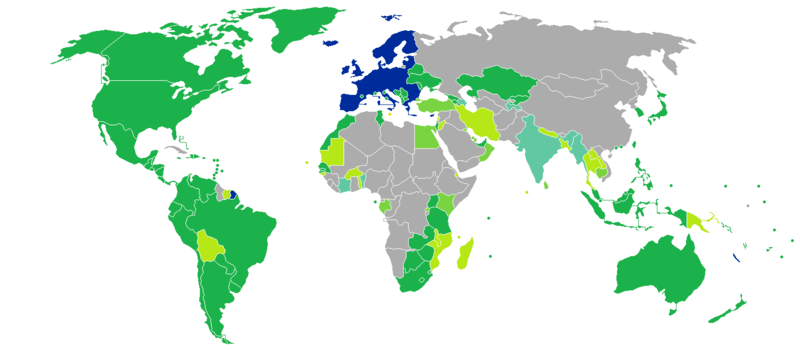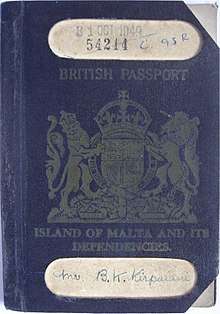Maltese passport
| Maltese passport | |
|---|---|
|
Cover of a Maltese biometric passport | |
| Date first issued | 29 September 2008[1] (biometric passport) |
| Issued by |
|
| Type of document | Passport |
| Purpose | Identification |
| Eligibility requirements | Maltese citizenship or Malta Individual Investor Programme |
| Expiration | 10 years |
| Cost |
|
The Maltese passport (Maltese: passaport Malti) is a passport that is issued to citizens of Malta. Every Maltese citizen is also a citizen of the European Union. The passport, along with the national identity card allows for free rights of movement and residence in any of the states of the European Economic Area, as well as Switzerland.
Physical appearance
Maltese passports share the common design standards of European Union passports. The cover is burgundy with the coat of arms of Malta emblazoned in the centre. The words "UNJONI EWROPEA" (English: European Union) and "MALTA" are inscribed above the coat of arms, with "PASSAPORT" (English: Passport) and the international biometric passport symbol below.
Travel restrictions

As of May 2018, Maltese citizens had visa-free or visa on arrival access to 182 countries and territories, ranking the Maltese passport 7th in the world (tied with the passports of the Czech Republic and New Zealand) according to the Visa Restrictions Index.[3]
Maltese citizens can live and work in any country within the European Economic Area (consisting of the states of the European Union and the European Free Trade Association) as a result of the right of free movement and residence granted in Article 21 of the Treaty on the Functioning of the European Union.[4]
Investment-based citizenship scheme

In January 2014 Malta started granting citizenship for a €650,000 contribution plus investments, contingent on residence and criminal background requirements,[5] under the so-called "Individual Investor Programme"[6] Henley & Partners was originally appointed as sole agent for the sale of Maltese passport, but the Muscat government later opened the scheme to Maltese firms too. The procedure is managed formally by the governmental agency Identity Malta.[7] The number and background of persons granted Maltese citizenship based on investment is unknown, as the Maltese government does not publish such data. Malta's Data Protection Commissioner confirmed that the publication of the number of passport buyers and their country of origin “may prejudice relations with a number of the countries of origin” and that revealing the agencies that handled their application “could reasonably be expected to prejudice commercial interests and, ultimately, the competitiveness of approved agents as it would reveal commercially-sensitive information”.[7] The list of persons who were naturalised Maltese in the year 2015[8] includes over 900 names (listed by first name) without indication of previous/second citizenships and of reasons for naturalisation. This was criticised as not transparent enough.[9] Many of the names are typical Arab, Russian, and Chinese names. Most "investors" are understood to be interested in acquiring Maltese citizenship only as a tool to exploit EU citizenship rights and reside elsewhere in the Union, including the UK. [9] The European Parliament had objected to the programme as a sell-out of EU citizenship.[10] The income from Malta's passport sale amounted to €163.5 million in 2016. Of this, 70% is deposited in the so-called National Development and Social Fund (NDSF), which was set up in July 2016. The use of the fund by the government is not regulated.[11]
See also
References
- ↑
- ↑
- ↑ "Global Ranking - Passport Index 2018" (PDF). Henley & Partners. Retrieved 22 May 2018.
- ↑ "Treaty on the Function of the European Union (consolidated version)" (PDF). Eur-lex.europa.eu. Retrieved 2015-04-17.
- ↑ Clenfield, Jason (11 March 2015). "Passport King Christian Kalin Helps Nations Sell Citizenship – Bloomberg Business". Bloomberg.com.
- ↑ Individual Investor Programme
- 1 2 Times of Malta
- ↑ list of persons who were naturalised Maltese in the year 2015
- 1 2 Politico Europe
- ↑ European Parliament
- ↑ Times of Malta, 6 November 2017
External links